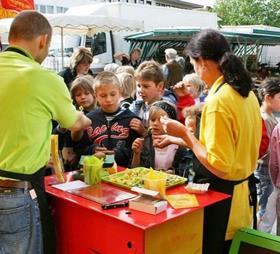
Leading kiwifruit marketer Zespri is preparing to roll out a series of high-profile consumer marketing campaigns, which it says are essential to ensuring continued strong sales, as it embarks on its earliest New Zealand season ever. The first vessel of fruit arrived in Zeebrugge at the end of April.
Weather conditions have reportedly been ideal for this year’s crop, with New Zealand experiencing a cold winter, followed by an excellent flowering period and good pollination in most areas. A warm summer followed with adequate rainfall. “This season, Zespri has got a clean crop, good yield, size and quality,” said the company’s European general manager Luc Clerx. “To date, this has been one of the best growing seasons we’ve had.”
For the New Zealand season, Zespri’s European team says is aiming to sell at least the same volume of Zespri Green, Gold and Organic fruit as it did last year. “Market conditions in Europe are quite different compared to past seasons and to make sure we have a strong start in optimum conditions, television campaigns are planned in five countries: Belgium, Holland, Germany, Spain and Italy,” confirmed Mr Clerx.
In Italy, Zespri will be advertising on television for the first time, focusing on Zespri Gold. The 10-second advert will be repeated at regular intervals in order to raise awareness of Zespri Gold in the country and to create additional consumer demand the fruit. The European arm of Zespri has also lined up a number of high-impact marketing activities across Europe to boost kiwifruit sales, as well as additional, tailor-made projects which have been organised in partnership with customers.
In the Benelux, Spain and Italy, nationwide promotional activities will primarily target specialised fruit shops, through which a concerted drive to increase consumer awareness will be rolled out. The specialised outlets campaign will also be strongly supported by a range of point-of-sale materials.
For the retail trade in Germany and Italy, meanwhile, consumer-facing promotions have been developed for a number of key customers, according to Zespri. These activities are scheduled to run throughout the summer, with the aim of building on last year’s successful retail campaigns.
Last but not least, the famous, long-running Zespri roadshows will once again descend on a number of shops across Europe. Teams of Zespri representatives will be on the move during course of the entire New Zealand kiwifruit season, promoting and selling the branded kiwifruit in shops, supermarkets and hypermarkets. In total, more than 9,600 individual roadshow events all expected to take place throughout Europe. “This is one of the first activities ever implemented by Zespri,” said Mr Clerx, “but it still remains one of the strong pillars of the Zespri marketing mix.”
Beyond the shops and supermarkets, additional marketing support will be present in the form of a range of school promotional activities, which will run in many of the company’s key European markets, alongside a renewed programme for health professionals. Both the school and healthcare projects will focus on health and in particular the possible nutritional benefits of regularly eating kiwifruit.
Throughout the course of this season, Zespri’s overall aim is to maintain a strong focus on customer demands, especially with regard to quality, service and supply, said Mr Clerx. “Our customers are important partners for Zespri and these partnerships are vital to further build up the Zespri business,” he adds.
Meanwhile, in a letter sent recently to growers, Zespri’s chief executive officer Lain Jager revealed that global export volumes of green kiwifruit, mainly consisting of the Hayward variety, grew by over 10m trays in the 2007/08 season. This increase in Hayward supplies is posing a looming threat to the New Zealand industry, which is facing downward pressure on prices because of growing oversupply issues.
“Our understanding is that Hayward volumes around the world will continue to increase,” Mr Jager told Fruitnet.com last month. With New Zealand’s production of the variety growing by about 5 per cent every year, a continued downturn in the global economy next year may mean the level of kiwifruit dumping in the country will increase.



